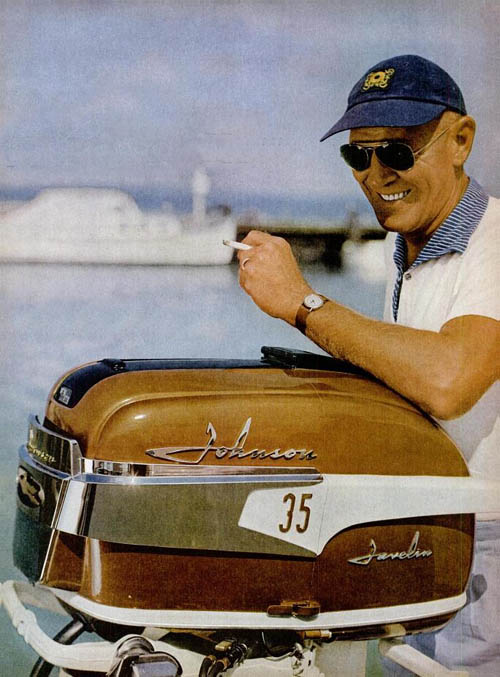Forty-two fargin’ degrees? What is this, March?
Gloomy, too. Gusty winds that would knock a squirrel off course as he leaped from branch to branch - tumble, bounce, scramble away. Although the neighborhood children did find a dead squirrel in the lawn last week, and it was an object of great satisfaction. They told no one for a while, but kept it to themselves so they could chart the progress of the Miracle of Decomposition. I was tempted to go out with a bottle of lighter fluid and give it a Viking funeral, but nature has its uses for things like that.

Things I have picked up from the web that amuse me: he's almost become unrecognizable in the latter stages of his pitchman career.

A friend of mine at work interviewed him the other day. He's thinking of buying property in Minnesota - has some family connections - because it'll be a good place in the future, what with the global warming.
This is the scariest outboard motor ad in the history of unnerving outboard motor ads! Or: this is the best outboard motor ad in the history of great outboard motor ads:

Outboard motor design in the 50s and 60s needs to be celebrated and appreciated, held up as something unique: the design consisted mostly of the engine cowl, which took its cues from auto styling. But it turned into something unlike any other engine or form of transporation. They were fantastical items from an alternative world in which we'd not only gone to the moon but filled up the craters with good ol' American H20, so we could drive our boats around really fast. I love these things.

Via a tweet from someone, a link to a story about “A Slow-Books Manifesto.” The title gave me hives.
The first sentence suggested an advanced case of Features Disease, a style of writing common to style sections in American newspapers.
Everywhere you look these days, there's a new "slow" movement.
No, there isn’t. Let me rewrite that: “In the cultural cocoon where I reside, the term ‘slow’ is being attributed to disparate things, and when I mentioned this at lunch to two friends they agreed. It’s probably a movement then. I know I read about it in the Times.”
Since 1989, when the activists behind the Slow Food manifesto began calling on us to change the way we eat—arguing that meals that take time to prepare are better for our health, our world, and our happiness than faster foods—their ideas have steadily gained power. In recent years, splinter groups like the Slow Beer Movement and the Slow Cocktail Movement have formed.
A November Washington Post piece by author-to-be Emily Matchar trumpeted the even newer New Domesticity Movement—so new that her book about it won't be out till next year. The effort unites a growing number of people interested in old-fashioned household activities—like making their own jams, whiskey, and pickled vegetables. They do it "both for fun and for a greater sense of control over what we eat," as Matchar wrote.
Nothing that encompasses breadmaking, sewing, whiskey manufacturing and reading can be a Movement. The term appeals to people anxious to know the next wonderful thing that will deepen and enrich and nourish and infuse commonplace ideas with some Splenda-sweetened spirituality. But is the Slow Movement a splitter group of New Domesticity, or a complementary idea that walks alongside? “New Domesticity” last came around with Martha Stewart, I think; one of those imperatives to return to basics and make cookies by hand.
If you thought I was being a bit cruel abut people who join these movements:
I'm all for efforts like these. But why so much emphasis on what goes into our mouths, and so little on what goes into our minds? What about having fun while exerting greater control over what goes into your brain? Why hasn't a hip alliance emerged that's concerned about what happens to our intellectual health, our country, and, yes, our happiness when we consume empty-calorie entertainment?
Why hasn’t a hip alliance emerged? I ask myself the same thing every day. Anyway, the idea is to read 30 minutes a day, and read the classics.
But Slow Books will have standards about what kinds of reading materials count towards your daily quota. Blog posts won't, of course, but neither will newspaper pieces or even magazine articles.
Also excluded: non-literary books.
Who defines “non-literary,” I wonder?
Why the emphasis on literature? By playing with language, plot structure, and images, it challenges us cognitively even as it entertains. It invites us to see the world in a different way, demands that we interpret unusual descriptions, and pushes our memories to recall characters and plot details.
It also encourages the development of empathy, although I suspect it has to be the right sort of empathy for the right sort of person. You know, I really got a better sense of white persecution after I read “The Turner Diaries,” and their struggle against ZOG. I feel different about them now.
Best of all, perhaps, serious reading will make you feel good about yourself.
Best of all. Of course that’s best of all.
Surveys show that TV viewing makes people unhappy and remorseful—but when has anyone ever felt anything but satisfied after finishing a classic?
Again, define “Classic.” And define “satisfied” - there’s relief, but that’s different. As I may have noted before, I read almost nothing but Penguin Classics in college and the years that followed. Read all the brick-thick Russian novels, the slender Turgenevs, the collections of Ukranian poets, the unending Roman accounts of Roman heroics, the vast novels of Hugo. The satisfaction at the end came from a sense of completion as much as an appreciation for the work. “Les Miserables” is no small task, after all.
To recap: it’s an argument for reading long-form fiction. Fine. I’m all for it; job security. But nothing makes me want to insist that everyone’s daily fiction diet should consist of Jack Chick tracts than calling this a Movement, giving it a Manifesto, setting up some rules, and saying it’s the sort of thing that should produce a “hip alliance.”